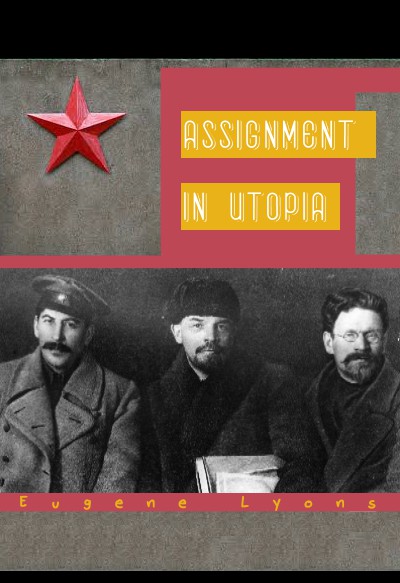
Assignment In Utopia PDF
500 Pages·1932·1.3045 MB·other
Most books are stored in the elastic cloud where traffic is expensive. For this reason, we have a limit on daily download.
Preview Assignment In Utopia
Description:
Assignment in Utopia
by
Eugene Lyons
This is a story of belief, disillusionment and atonement. Long identified with leftist causes, the journalist Eugene Lyons was by background and sentiment predisposed to early support of the Russian Revolution. A "friendly correspondent," he was one of a coterie of foreign journalists permitted into the Soviet Union during the Stalinist era because their desire to serve the revolution was thought to outweigh their desire to serve the truth. Lyons first went to the Soviet Union in 1927, and spent six years there. He was there as Stalin consolidated his power, through collectivization and its consequences, as the cultural and technical intelligentsia succumbed to the secret police, and as the mechanisms of terror were honed. As Ellen Frankel Paul notes, "It was this murderous reality that Stalin's censors worked so assiduously to camouflage, corralling foreign correspondents as their often willing allies." Lyons was one of those allies.Assignment in Utopia describes why he refused to see the obvious, the forces that kept him from writing the truth, and the tortuous path he traveled in liberating himself. His story helps us understand how so many who were in a position to know were so silent for so long. In addition, it is a document, by an on-the-scene journalist, of major events in the critical period of the first Five-Year Plan. As Ellen Frankel Paul notes, Assignment in Utopia is particularly timely. The system it dissects in such devastating detail is in the process of being rejected throughout Eastern Europe and is under challenge in the Soviet Union itself. The book lends insight into the "political pilgrim" phenomenon described by Paul Hollander, in which visitors celebrate terrorist regimes, seemingly oblivious to their destructive force. The book is valuable for those interested in the Stalinist era in the Soviet Union, those interested in radical regimes and political change, as well as those interested in better understanding current events in Europe. It will also be useful for the tough questions it poses about journalistic ethics
This is a story of belief, disillusionment and atonement. Long identified with leftist causes, the journalist Eugene Lyons was by background and sentiment predisposed to early support of the Russian Revolution. A "friendly correspondent," he was one of a coterie of foreign journalists permitted into the Soviet Union during the Stalinist era because their desire to serve the revolution was thought to outweigh their desire to serve the truth. Lyons first went to the Soviet Union in 1927, and spent six years there. He was there as Stalin consolidated his power, through collectivization and its consequences, as the cultural and technical intelligentsia succumbed to the secret police, and as the mechanisms of terror were honed. As Ellen Frankel Paul notes, "It was this murderous reality that Stalin's censors worked so assiduously to camouflage, corralling foreign correspondents as their often willing allies." Lyons was one of those allies.Assignment in Utopia describes why he refused to see the obvious, the forces that kept him from writing the truth, and the tortuous path he traveled in liberating himself. His story helps us understand how so many who were in a position to know were so silent for so long. In addition, it is a document, by an on-the-scene journalist, of major events in the critical period of the first Five-Year Plan. As Ellen Frankel Paul notes, Assignment in Utopia is particularly timely. The system it dissects in such devastating detail is in the process of being rejected throughout Eastern Europe and is under challenge in the Soviet Union itself. The book lends insight into the "political pilgrim" phenomenon described by Paul Hollander, in which visitors celebrate terrorist regimes, seemingly oblivious to their destructive force. The book is valuable for those interested in the Stalinist era in the Soviet Union, those interested in radical regimes and political change, as well as those interested in better understanding current events in Europe. It will also be useful for the tough questions it poses about journalistic ethics
See more
The list of books you might like
Most books are stored in the elastic cloud where traffic is expensive. For this reason, we have a limit on daily download.
